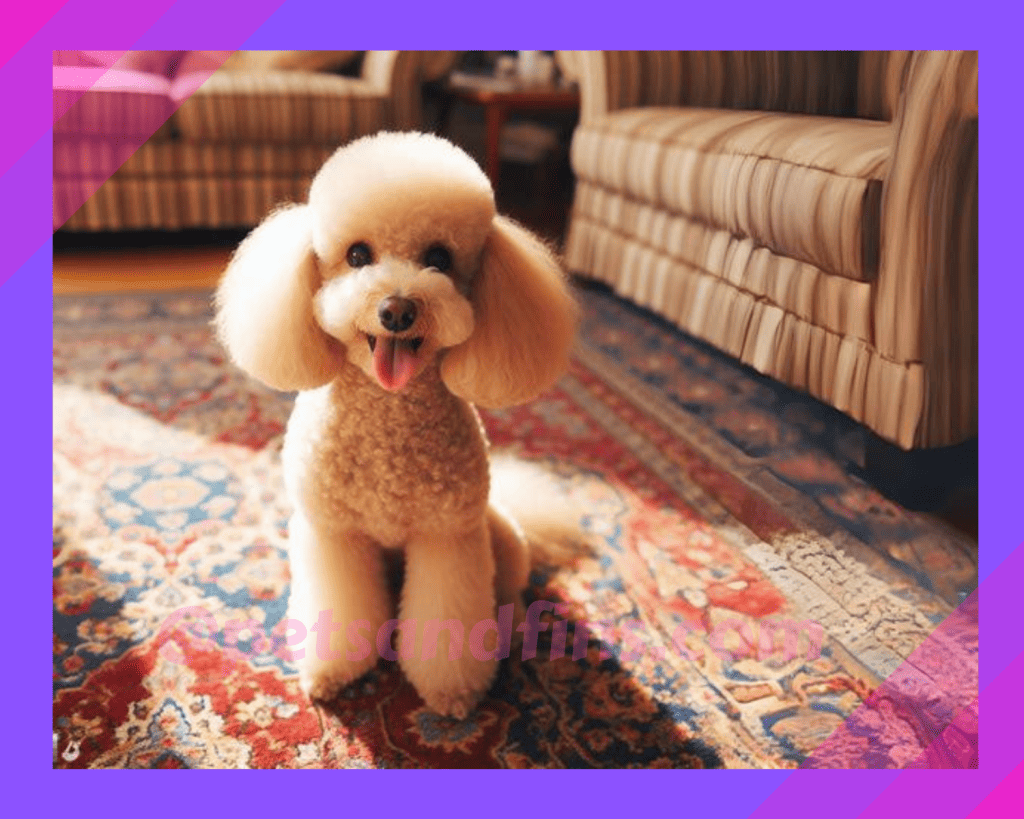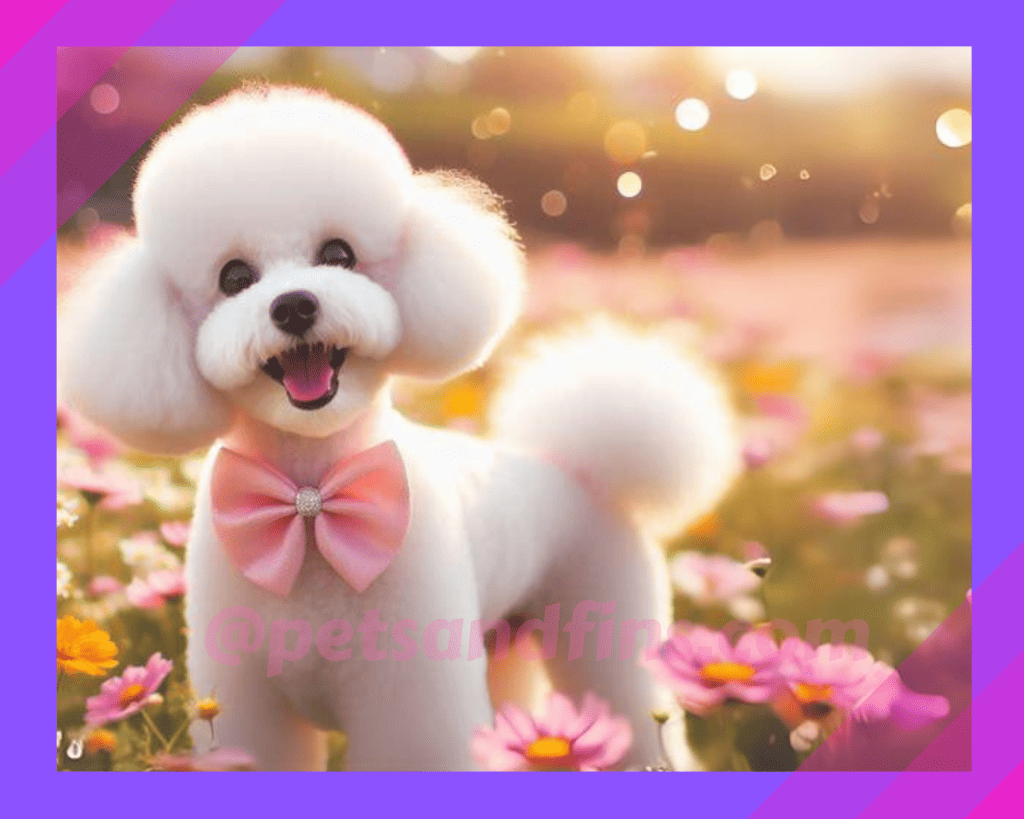Poodles are known for their elegance and grace, but Are Poodles Intelligent?? Are these prancing pups truly smart? Let’s delve into the fascinating world of poodle intelligence and explore what makes them tick.
Are Poodles Intelligent? – Evidence for High Intelligence
Let’s talk about how smart Poodles are! These dogs are like the brainiacs of the dog world. They can learn things super fast, figure out problems, and show us how clever they are. In this discussion about Poodle smarts, we’ll look at lots of proof that tells us just how sharp and bright these furry friends really are. From quickly picking up commands to doing well in brain games, the evidence for Poodle intelligence is like a cool adventure into their super smart minds.

Trainability: Poodles consistently rank among the most trainable dog breeds. They are eager to please and readily learn new commands and tricks. This trainability suggests a high level of intelligence and cognitive ability.
Problem-solving: Poodles are known to be resourceful and creative problem solvers. They are adept at figuring out puzzles and finding solutions to challenges, showcasing their intelligence and adaptability.
Learning and memory: Poodles have exceptional learning and memory capacity. They can remember commands and routines for years, even learning complex sequences of actions. This remarkable memory further supports their intellectual prowess.
Communication: Poodles are adept at understanding human communication, both verbal and nonverbal. They can interpret our emotions, gestures, and tone of voice, demonstrating their ability to process and respond to complex information.
Beyond Obedience and Tricks: The Emotional Intelligence of Poodles
In the enchanting world of canine companionship, Poodles stand out not only for their elegant appearance and remarkable ability to learn tricks but for a captivating depth that transcends conventional expectations. Beyond mere obedience and clever antics, Poodles exhibit a profound level of emotional intelligence that sets them apart in the realm of dog companions.

Empathy: Poodles are highly sensitive to human emotions. They can sense when someone is feeling sad, happy, or anxious and react accordingly. This empathy reveals a profound understanding of human emotions and the ability to respond in a caring manner.
Social intelligence: Poodles are highly social creatures and navigate complex social situations with ease. They understand social cues, hierarchies, and pack dynamics, demonstrating their ability to process social information and engage in meaningful interactions.
Self-awareness: Poodles exhibit a surprising degree of self-awareness. They recognize themselves in mirrors and can understand their own limitations and capabilities. This self-awareness suggests a complex understanding of their own existence and place in the world.
Factors Influencing Intelligence

Genetics and breeding: While poodles are naturally intelligent, individual intelligence can vary depending on genetics and breeding practices. Responsible breeders strive to maintain and improve intelligence through careful selection and breeding programs.
Early socialization and training: Early exposure to different environments, people, and animals can significantly enhance a poodle’s intelligence. Early training also helps develop cognitive skills and problem-solving abilities.
Individual personality: Like humans, poodles have distinct personalities and learning styles. Some poodles may excel at obedience training, while others might shine in agility courses. Recognizing individual strengths and tailoring training accordingly can unleash their full potential.
Stanley Coren’s “The Intelligence of Dogs”

Stanley Coren’s “The Intelligence of Dogs” is a groundbreaking book first published in 1994 that explores the fascinating world of canine intelligence. It delves into various aspects of dog intelligence, including:
1. Defining Canine Intelligence:
Coren proposes three distinct types of intelligence in dogs: instinctive intelligence, adaptive intelligence, and working and obedience intelligence.
He goes on to explain how these types of intelligence manifest differently in various breeds.
2. Breed Rankings:
The book famously ranks dog breeds based on their intelligence and trainability.
Poodles consistently rank among the top breeds, showcasing their exceptional learning abilities and eagerness to please.
The ranking system considers factors such as trainability, problem-solving skills, and obedience commands.
3. Understanding Dog Behavior:
Coren explores the evolutionary origins of dog behavior, highlighting how their intelligence evolved alongside humans.
He discusses the importance of understanding canine communication, including vocalizations, body language, and facial expressions.
This understanding helps us build stronger bonds with our furry companions.
4. Training and Enrichment:
The book emphasizes the importance of early socialization and training for all dogs, regardless of intelligence level.
Coren provides practical training tips and techniques tailored to different breeds and intelligence types.
He also advocates for providing dogs with enriching activities, such as agility courses, puzzle toys, and interactive games, to stimulate their minds and prevent boredom.
5. Debunking Myths:
Coren dispels common myths surrounding dog intelligence, such as the notion that large dogs are less intelligent than small dogs.
He emphasizes the importance of individual differences within breeds and encourages us to appreciate each dog’s unique talents and capabilities.
Overall, “The Intelligence of Dogs” is a must-read for anyone interested in learning more about canine intelligence. It provides valuable insights for dog owners, trainers, and anyone who wants to strengthen their bond with their furry friend.
While the book has received some criticism for its ranking system and methodology, its comprehensive approach to understanding canine intelligence remains influential. It has sparked further research and discussion about the cognitive abilities of our beloved companions.
Why are Poodles Intelligent:

Research suggests that several factors contribute to the high intelligence of poodles.
First, their genetics and breeding history play a significant role. Poodles have been specifically bred for centuries to excel in activities requiring intelligence and trainability, such as hunting and retrieving. This selective breeding has resulted in poodles inheriting genes associated with cognitive abilities and learning potential.
Second, research indicates that poodles possess exceptional working and social intelligence. This means they excel not only at learning and performing commands but also at understanding human emotions, interpreting social cues, and navigating complex social situations. Their remarkable ability to read human communication allows them to form strong bonds and collaborate effectively with their owners.
Finally, early socialization and training play a crucial role in enhancing poodle intelligence. Exposing poodles to various environments, people, and animals during their formative stages stimulates their cognitive development and allows them to learn social skills and adapt to different situations.
Additionally, providing poodles with consistent training opportunities helps them develop their problem-solving abilities, strengthen their memory, and enhance their overall intelligence.
Adaptive Intelligence of Poodles:

Research reveals poodles shine in adaptive intelligence. This means their ability to learn and solve problems in new environments is exceptional.
Studies like “Comparison of working and social intelligence in different dog breeds” by Miklósi et al. (2003) demonstrate their superior performance in both working and social contexts, showcasing their remarkable adaptability and versatility.
These findings highlight the potential of poodles to excel in various training disciplines, from agility courses to obedience commands, and their ease in adjusting to new situations, making them highly adaptable and resourceful companions.
Studies have shown that poodles can excel at solving complex problems, even learning to open doors, navigate obstacles, and perform impressive tricks. This remarkable adaptability, combined with their trainability and social intelligence, makes poodles valuable companions for individuals seeking a versatile and intelligent furry friend.
Training Your Poodle: A Research-Based Approach

Research on canine cognition highlights the effectiveness of positive reinforcement training for poodles. This approach focuses on rewarding desired behaviors with treats, praise, and affection, encouraging them to learn and repeat positive actions.
Studies demonstrate that poodles respond well to clear, consistent commands delivered using a positive and encouraging tone. Early socialization and exposure to diverse environments are also crucial for fostering well-rounded poodles, as these experiences enhance their learning capabilities and promote positive interactions with humans and other animals.
By employing research-based training methods, you can cultivate a strong bond with your poodle, unlocking their potential and fostering a happy and fulfilling life for both of you.
There are several books on training poodles, each with its own strengths and weaknesses. Here are a few recommendations:
1. “Poodles For Dummies” by Gina Spadafori: This beginner-friendly guide covers everything you need to know about training your poodle, from puppyhood to adulthood. It includes information on basic commands, obedience training, and troubleshooting common problems.
2. “The Everything Poodle Book” by Janine Adams: This comprehensive guide offers in-depth information on all aspects of poodle care, including training. It provides detailed instructions on teaching your poodle a variety of commands and tricks, as well as tips for dealing with specific behavioral challenges.
3. “The Poodle Handbook: The Essential Guide to Standard, Miniature & Toy Poodles” by Pippa Mattinson: This breed-specific handbook provides detailed information on training poodles, tailored to their unique needs and characteristics. It includes tips for motivating your poodle, using positive reinforcement, and addressing common training issues.
4. “Clicker Training for Poodles” by Patricia McConnell: This book focuses on using clicker training methods to teach your poodle a variety of commands and tricks. Clicker training is a highly effective and positive reinforcement-based method that can be very successful with poodles.
Are Poodles among the top 10 intelligent dog breeds?
Exploring the intriguing world of canine intelligence unveils the question of whether Poodles, with their distinct charm and graceful demeanor, stand among the top 10 most intelligent dog breeds. Renowned for their quick learning ability and impressive problem-solving skills, Poodles have consistently captivated dog enthusiasts and trainers alike.

In fact, they are consistently ranked near the top by various sources, including:
Stanley Coren’s “The Intelligence of Dogs”: This book ranks poodles as the second most intelligent breed, just behind the Border Collie.
The American Kennel Club: The AKC lists poodles as one of the “brightest and most trainable” breeds.
The Institute of Canine Cognition: This research institute conducted a study that found poodles to be among the best performers in a variety of cognitive tasks.
Beyond Obedience and Tricks: The Deeper Intelligence of Poodles
Delving into the world of Poodles reveals a captivating facet beyond their charming appearance and graceful demeanor—their deeper intelligence. Poodles, often celebrated for their elegant curly coats and regal posture, possess a cognitive prowess that goes far beyond mere obedience.
Beyond the fluff and poise, Poodles exhibit a profound cognitive depth, making them not just delightful companions but intriguing individuals with an intellect that adds an extra layer of fascination to their canine allure.

Poodles are renowned for their exceptional trainability and quick learning, but their intelligence extends far beyond mastering commands and tricks. Here are some fascinating aspects of poodle intelligence that go beyond the usual:
1. Problem-Solving Prowess: Poodles are adept at figuring out solutions to challenges and puzzles. They can utilize their cognitive skills to navigate complex situations, find hidden objects, and even open doors or latches. Their resourcefulness and ability to think outside the box make them impressive problem solvers.
2. Emotional Intelligence: Poodles exhibit remarkable emotional intelligence, recognizing and responding to human emotions. They can sense and react to feelings like sadness, happiness, and anxiety, showcasing their empathy and understanding of human behavior. This emotional intelligence allows them to build strong emotional bonds with their owners and offer comfort and support when needed.
3. Strong Social Intelligence: Poodles excel in social interactions, adeptly navigating complex pack dynamics and social hierarchies. They understand nonverbal cues, body language, and social signals, allowing them to engage positively with other dogs and humans. This social intelligence makes them adaptable and well-adjusted companions in various social settings.
4. Exceptional Memory: Poodles possess remarkable memory abilities, retaining information and experiences for extended periods. They can remember commands, routines, and even specific individuals they encountered years ago. This impressive memory facilitates learning and training, allowing them to build upon existing knowledge and adapt to new situations.
5. Adaptability and Creativity: Poodles are highly adaptable creatures, readily adjusting to new environments, routines, and training methods. They possess a degree of creativity, finding unconventional solutions to problems and sometimes even surprising their owners with their innovative approaches. This adaptability and creativity make them versatile companions, suitable for various lifestyles and activities.
6. Learning Beyond Commands: Poodles are inquisitive and enjoy learning new things, even beyond basic commands and tricks. They can be trained in various dog sports like agility or flyball, excel in obedience competitions, and even learn complex tasks like search and rescue or detection work. Their eagerness to learn and curiosity allows them to expand their knowledge and skills throughout their lives.
7. Individual Differences: While poodles are generally known for their intelligence, individual variations exist. Some poodles may excel in specific areas like problem-solving or social interaction, while others might shine in obedience training or agility. Recognizing these individual strengths and tailoring training accordingly can unlock their full potential and maximize their learning experience.
These are just a few glimpses into the fascinating realm of poodle intelligence. Understanding these aspects can help you appreciate their cognitive abilities beyond the surface level and build a stronger, more meaningful bond with your furry companion. Remember, every poodle is unique, and their intelligence manifests in individual ways, making them truly remarkable creatures.
Conclusion: A Smart and Savvy Companion
Poodles are undoubtedly intelligent dogs, displaying remarkable abilities in learning, communication, problem-solving, and social interaction. Their intelligence, coupled with their eagerness to please and affectionate nature, makes them ideal companions for families with children or active individuals seeking a smart and loyal partner.
Remember, while intelligence is an inherent trait in poodles, providing them with enriching experiences, positive reinforcement, and opportunities to learn can unlock their full intellectual potential and create a strong, fulfilling bond between you and your furry friend.

